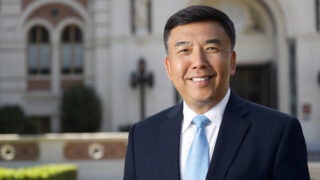USC and California Emerging Technology Fund form partnership to close the digital divide
The research partnership will determine just how far California has to go to close critical gaps in internet access, an issue exacerbated by the pandemic.
During a pandemic that has magnified inequities for Americans, USC and the California Emerging Technology Fund have partnered to measure internet access in the state based on demographics and location, identify the impact on those lacking access as the world goes digital and inform policymakers on how to close the gap.
Together, USC and CETF are administering the Statewide Survey on Broadband Adoption, a survey of 1,650 California adults to determine progress toward full broadband access, a public policy goal of state leaders. The survey began Feb. 10 and results are expected by the end of the month.
“USC is proud to partner with CETF to help drive policy to eliminate the digital divide,” said Sam Garrison, USC senior vice president of university relations. “The university brings a powerful, broad coalition of researchers to interpret this data and recommend policies for impactful solutions.”
CETF, a nonprofit foundation focused on digital equity in the state, has been monitoring California’s progress toward expanding internet infrastructure and digital access since 2008. This year’s survey is significant because it will be the first extensive survey of its kind to be conducted since the pandemic began.
“The COVID-19 pandemic laid bare the widespread inequities that demand immediate action to accelerate the deployment and adoption of high-speed Internet,” said Sunne Wright McPeak, CETF president and CEO.
“Pivotal research, combined with rich analysis and recommendations from distinguished USC faculty who are widely respected in their fields, will inform leaders in California and Washington, D.C., as collectively we work to tackle poverty and achieve digital equity by realigning public resources and attracting private investment with accountability for results.”
Experts from across USC to assess digital divide survey results
Hernan Galperin, associate professor of communication at the USC Annenberg School for Communication and Journalism, leads the research effort. Galperin has studied technology gaps in Los Angeles County that have been in the spotlight during the pandemic and has called for initiatives to keep people with low incomes from falling further behind.
“The new partnership between CETF and USC will promote our understanding of the digital divide in California and support evidence-based policies to address this challenge in a long-term, sustainable manner,” he said.
CETF has regularly assessed Californians’ broadband access for 14 years. During that time, access has increased steadily, reaching 88% of households in 2019 — the highest adoption level recorded since the statewide survey began in 2008. While California is a tech center and ranks as the world’s fifth-largest economy, it has the highest number of people living in poverty of any state.
According to the 2019 survey, 1 in 8 California households has no broadband. The most severely impacted demographic groups include households earning less than $20,000 per year, adults 65 and over, and adults without a high school diploma.
Researchers and experts from across the university will converge to analyze and interpret results of the survey, including: Stephen Aguilar and Dean Pedro Noguera of the USC Rossier School of Education; François Bar, Geoffrey Cowan and Adam Clayton Powell of USC Annenberg; Donna Benton and Kathleen Wilber of the USC Leonard Davis School of Gerontology; Conyers Davis of the USC Schwarzenegger Institute for State and Global Policy; Manuel Pastor of the USC Dornsife College of Letters, Arts and Sciences; and Dorian Traube of the USC Suzanne Dworak-Peck School of Social Work.



